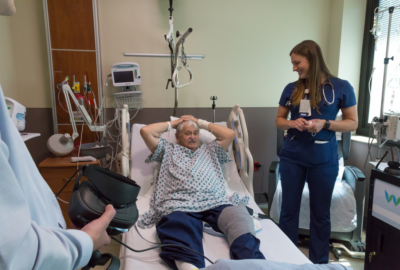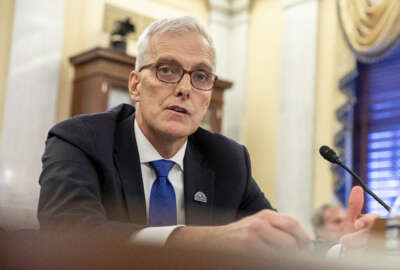McDonough: 6 VA health care workers fired for not following COVID-19 workplace protocols
The Department of Veterans Affairs is moving ahead with disciplinary action against health care employees who haven’t complied with COVID-19 workplace require...
The Department of Veterans Affairs is moving ahead with disciplinary action against health care employees who aren’t complying with COVID-19 workplace requirements, including firings.
VA Secretary Denis McDonough, in a press conference Monday, said six employees, to date, have been separated from the agency for noncompliance with the agency’s vaccine mandate for health care workers, as well as masking requirements.
One employee, he said, refused to give the agency their vaccination status at all. Four employees were terminated for refusing to wear a mask, and another for refusing to comply with COVID-19 testing requirements.
“We are in the process now of beginning that disciplinary process across the system,” McDonough said.
McDonough has repeatedly said that the VA will not challenge the legitimacy of any employee’s health or religious exemption requests. However, he said the VA will not allow vaccine exemptions for employees working in certain specialties, such as intensive care units or oncology.
“The decision here, at the end of the day, has been a clinical one. It’s how do we ensure veterans that we’ve taken every step within our power to ensure their safety and their security?” McDonough said.
VA is currently providing reasonable accommodations to employees who have requested an exemption from the vaccine mandate.
“That process is happening by facility and by network,” McDonough said, adding that he was not aware of any VA employee who has left the agency because they were dissatisfied with their reasonable accommodation.
The Biden administration continues to defend itself from several lawsuits challenging the legality of its vaccine and testing mandates.
The Supreme Court in January upheld the Biden administration’s mandate for most health care workers to be fully vaccinated against COVID-19. The court, however, struck down a broader mandate that would have required large businesses to ensure their employees are vaccinated or tested regularly.
Earlier this month, the Fifth Circuit Court of Appeals reversed a lower court’s ruling and upheld the administration’s requirement that all federal employees be vaccinated against COVID-19.
Federal appeals courts are still considering the legality of a vaccine mandate for federal contractors. Plaintiffs in those lawsuits argue that the mandate would affect about a fifth of the total U.S. workforce.
McDonough said last fall that more employees at the Veterans Health Administration sought medical or religious exceptions to the agency’s COVID-19 vaccine mandate than they have for the prior year’s flu vaccine policy.
McDonough also said last October that VHA employees, as part of the agency’s counseling process, will have several opportunities to share their vaccination status and provide the appropriate documentation to the department.
“I’ve had nurses coming up and making very strong, passionate, firm, professional, compelling arguments to me personally, and I appreciate that very much. I want to be part of a system where people have that ability to talk plainly, even passionately, to their leadership,” McDonough said Monday.
VA outlines phased office re-entry for the workforce
The VA, meanwhile, plans on bringing the rest of its workforce back to the office in several phases.
McDonough said some VA bargaining unit employees still on mandatory telework will return to the office in early May, while others will return later in May or June.
The agency, he added, remains engaged in negotiations with unions and bargaining unit employees at individual facilities across the country.
“Those are going to be managed at and rolled out at a local level. There won’t be one national date where the bargaining unit employees come back across VHA, VBA and NCA,” McDonough said.
Deputy VA Secretary Donald Remy said last month that the VA already brought non-bargaining unit employees back to the office. The agency, he added, expected bargaining unit employees to return to the office by May.
The office reentry affects only a portion of the VA’s total workforce. Remy said nearly 80% of its employees stayed “right on the front lines” since the start of the COVID-19 pandemic, providing health care to patients and administering services at national cemeteries.
McDonough, meanwhile, is preparing to field questions from lawmakers about the rollout of its new Electronic Health Record as part of the annual appropriations process.
The VA inspector general office, in a report issued Monday, warned of potential schedule delays with the agency’s stop-and-go rollout of the EHR. The report said every year of schedule delays will result in nearly $2 billion in cost overruns.
“I continue to believe that we have the budget authority that we need over the life of this project. If we have reason to believe that that’s changed, we’ll obviously go straight to Congress and talk that through with them. But at the moment, I believe we have the budget authority we need,” McDonough said.
Copyright © 2024 Federal News Network. All rights reserved. This website is not intended for users located within the European Economic Area.
Jory Heckman is a reporter at Federal News Network covering U.S. Postal Service, IRS, big data and technology issues.
Follow @jheckmanWFED






